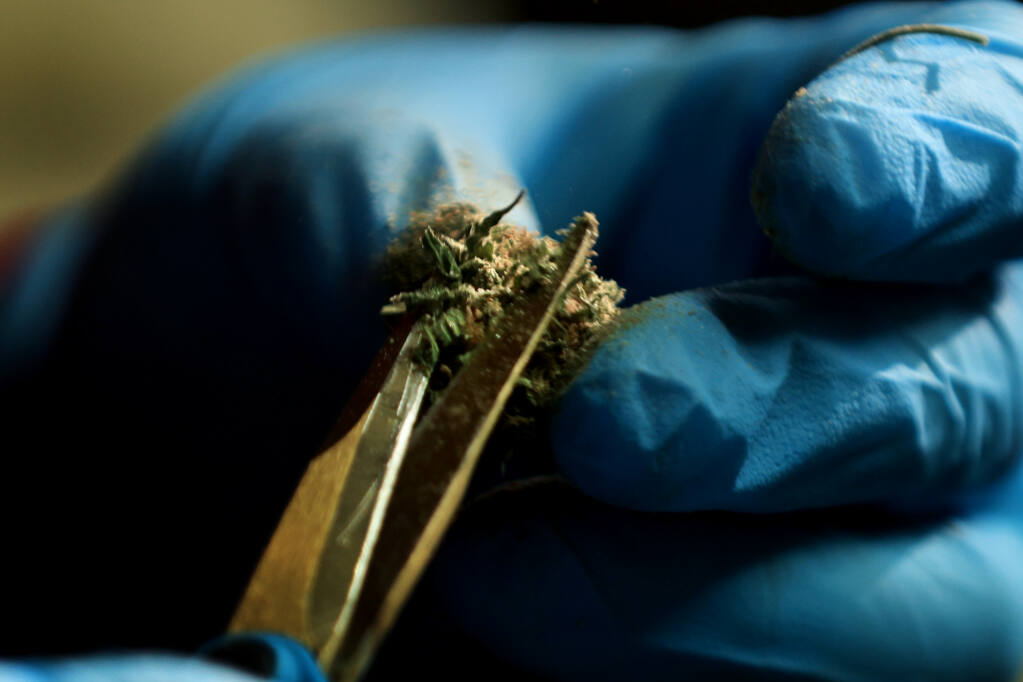
As the greater Bay Area region has prospered through the 21st Century, Lake County has been largely left behind, a rural area that has lagged economically compared to nearby counties.
Through the decades, there have been attempts at mining or resort getaways to help spur economic activity in the county, which is not easily accessed and has infrastructure challenges. But those fizzled while the county has been further hampered by a series of wildfires ripping through the picturesque mountains and valleys since the 2015 Valley fire.
But a fully legal cannabis industry in the aftermath of passage of Proposition 64 in 2016 has provided a new economic lifeline into Lake County, which has sparked optimism that it could boost the area that is largely driven by tourism and agriculture.
“We’re like Appalachia,” said Richard Derum, who owns a cannabis farm near Lower Lake and also serves as a consultant and real estate agent for the industry. “I think it (cannabis) will be the driving force for the next 50 years.”
The sentiment is shared by elected officials, which is striking as cannabis has not been as readily embraced in other nearby areas.
Lake County carves out a niche among its neighbors as a cannabis mecca
“I think from my guess the net gain has been positive,” said Lake County Supervisor Bruno Sabatier.
There has been more hiring farmworkers for the harvest of the plant that comes traditionally in the fall, though some are migrant workers who live outside the area, Sabatier said. In addition, those growers and companies also are buying at local stores to sustain those businesses.
“I will say there has definitely been an influx of money in the area because of these companies, whether that is to our local nonprofits or whether to our stores on what they are buying,” he said.
There are few specifics about the economic impact of the cannabis industry in Lake County, but there are some metrics. The county has 226 acres of licensed cannabis cultivation with about 100 operators. There are four licensed dispensaries with more on the way.
Most notably, Sabatier said that his staff expects that marijuana growers will contribute $13 million in taxes to the county over the past year.
Cannabis still isn’t tracked as an agricultural crop by counties across the state as it remains illegal under federal law. But Sabatier said marijuana would be the largest crop by cash value in Lake County, surpassing the $52.5 million in wine grapes from 2020 and the $16.6 million in pears.https://fe62854becc7fc9a1faa0bf6101b6e70.safeframe.googlesyndication.com/safeframe/1-0-38/html/container.html
Those numbers stand out as Lake County has traditionally lagged in economic performance compared to its surrounding neighbors. For example, on Friday the state Economic Development Department reported Lake County had an unemployment rate of 5.7% in December, down from a revised 5.9% in November.
That level was below the state’s 6.5% rate, but well above the 3.5% of Sonoma County, 4.1% of Napa County and 4.6% of Mendocino County.
An economic development report issued by the county in 2016 ― at the onset of recent wildfire activity — noted a higher high school graduation rate than the state and the nation. Lake County, however, also had fewer college graduates residing there compared to the levels of California and the United States.
“Growth rates in population, labor force, and housing has been stagnating for the past 5 years,” the report read.
“There’s certainly been a lot of interest in growing the amount of acreage up there with cannabis. I think they are slowly pulling it off,” said Robert Eyler, a Sonoma State University economist who studies the local economy.
While there may be some challenges in finding workers in a tight labor market and the ever-present risk of wildfires, Eyler said there is also potential, especially if growers can get tourists to visit similar to what occurs at local wineries.
“I think also if they can pull it off and embrace it, maybe with a tourism element to it, there’s some really strong possibilities up there,” Eyler said.
Growers point to the possibilities of cannabis tourism, which can complement the outdoor activities near Clear Lake along with the area’s wineries. All of that could provide visitors a range of activities to attract them from the Bay Area and other regions.
“There’s so much natural beauty here,” said Patty Lanier, who along with her husband grow cannabis on their farm also near Lower Lake.
One beneficiary already has been those in the real estate business though the deals have slowed down recently because of the wholesale price drop of cannabis statewide. Bobby Dutcher, a real estate broker from Lakeport, said he has done many deals with companies looking to buy land in Lake County, especially given lower land costs.
“We were just flooded with buyers in 2020 then the market just kind of collapsed. 2021 was really slow and I think 2022 will be the same way until a price kind of settles,” Dutcher said.
Dutcher also served as the past president of the Lake County Chamber of Commerce and added that most of the business community has been supportive of the cannabis industry, which isn’t the case in other places.
For example, the Chamber earlier this month held a ribbon cutting for the Green Heron Dispensary that just opened up in Lakeport.
“They buy things at the hardware store and at just all these different places. They’re hiring people and paying really good wages. And then some of these old buildings that just sat were sold,” he said.
He specifically noted the purchase of one vacant 65,000-square-foot building in Lakeport by Pro Farms out of Santa Barbara County that will be used as a processing facility for the local marijuana harvested.
In contrast, he noted, many of the grapes picked in Lake County are taken to facilities in the Napa Valley to be made into wine and the county loses out on additional economic benefit.
“We don’t want to see that happen to cannabis. It’s really important for me and the Chamber that we don’t see that model fall,” he said.
“When we were (really) growing pears here ― all the pears that stayed in the county were processed here and all those jobs stayed in the county until they shipped them out. It’s really important the same thing happens to cannabis.”
